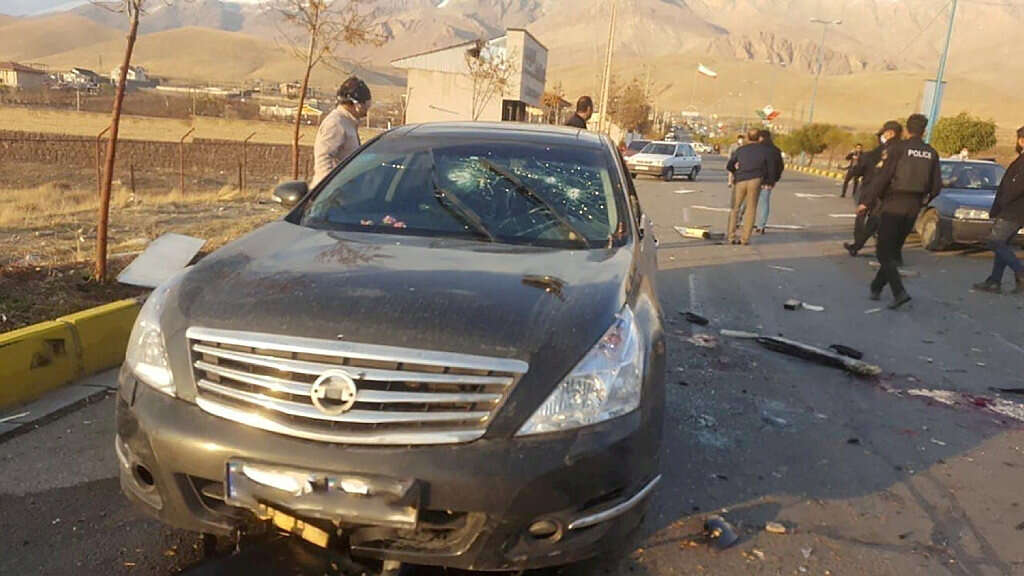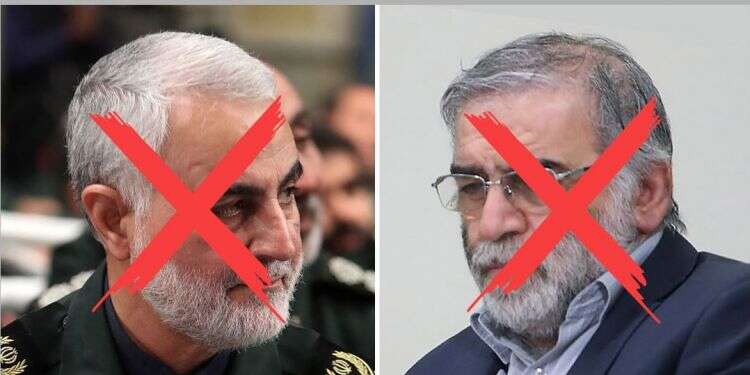Many have had a rough year in 2020 but for Iran, this has been a particularly dark time. As if the devastation the global pandemic has wreaked on it – the Islamic republic is the hardest coronavirus-hit country in the Middle East – and the crippling American sanctions were not enough, the ayatollahs' regime has suffered the loss of two key figures.
Quds Force Commander Gen. Qasem Soleimani, killed in a US drone strike in January, and now Mohsen Fakhrizadeh, the head of its military nuclear program, who was assassinated on Friday, were unique figures. Each was dominant in his field and they wielded considerable power.
Follow Israel Hayom on Facebook and Twitter
Soleimani was entrusted with "exporting" the Shiite revolution outside Iran, and Fakhrizadeh was tasked with giving Tehran internal immunity in the form of a nuclear weapon, thus allowing the ayatollahs to power ahead with their imperialistic plans.
The cliché says that no one is irreplaceable and while that may be true, the burden of proof always falls to the replacement.
Soleimani's successor, Gen. Esmail Ghaani, has been struggling to follow in his predecessor's footsteps, as evident by the fact he has far less influence over Tehran and by the fact that he is less effective in targeting Iran's enemies, namely Israel, Saudi Arabia, the Gulf states, and the US.
Iran's Supreme Leader Ayatollah Ali Khamenei is likely to announce Fakhrizadeh's replacement soon. The latter worked for an organized apparatus and had various deputies, but it is doubtful that his successor will be as dominant.

Fakhrizadeh was involved in Iran's nuclear program since its inception, played a key role in its development and, just like Soleimani, developed a very close rapport with Khamenei, something that earned him the respect of Iran's entire regime.
Iran's top nuclear scientist had a target on his back for over 15 years. Foreign media reports said that Israel – long believe to have assassinated several of Iran's nuclear scientists a decade ago – wanted to eliminate him in the past, but then-Prime Minister Ehud Olmert opted against the move.
Fakhrizadeh was aware of the fact he was a wanted man. He traveled in an armored car and had round-the-clock security. The fact that the regime had him airlifted to the hospital in an attempt to save his life reflects his value to Tehran.
Iranian and international media named Israel's Mossad intelligence agency as the force behind the assassination.
The Mossad has also been linked to a series of other successful operations recently, including the elimination of al-Qaida terrorist mastermind Abu Muhammad al-Masri, who was allegedly taken out by Israeli agents at Washington's behest on Iranian soil, and the explosion at the centrifuge plant near the Natanz nuclear facility. This indicates that the intelligence agency is able to execute highly complex operations in extremely hostile territory.
The Mossad's abilities were also likely put to use on Friday. Past reports have alleged that these types of operations see the Mossad use local agents to avoid having Israeli agents captured in the event that an operation fails.
It appears that "outsourcing" the operation did not affect the quality of its execution. An analysis of the operation indicates meticulous preparation and planning and the high professionalism of the part of the agents on the ground, who carried out the hit and fled the scene with great success.
If Israel was the one behind the operation, it seems that it sought to take advantage of the window of opportunity before US President-elect Joe Biden takes office to deal a blow to one of its archfoe before the world's new policeman set new rules of conduct.
Israel most likely expected the predictable condemnations from the European Union and from other officials, like Former Central Intelligence Agency Director John Brennan, who called the assassination "an act of state-sponsored terrorism." But there is no need to fret. The world is a better place now that the likes of Fakhrizadeh no longer walk the earth and any move that prevents Iran from making any dash toward a nuclear bomb is a welcome one.
Israel, for its part, must take Iran's threats of retribution seriously.
Soleimani was eliminated by the Americans - an opponent too formidable for the Iranians to take on. Fakhrizadeh's assassination was, according to foreign media reports, the work of Israel – an opponent with which Iran finds it much easier to deal.
Retaliation could come in many ways: via Syria or Lebanon, which share borders with Israel; through attempts to target Israeli officials, to attacks on Israeli embassies around the world.
The Iranians cannot afford a knee-jerk reaction. Tehran's primary interest is to see the American sanctions lifted and the near-unraveled nuclear deal stitched back together. It is therefore hard to imagine it would risk an incident that torpedoes this strategic goal, so it will likely target an Israeli asset that, while substantial, won't trigger regional escalation.
This requires Israel to remain vigilant at home and abroad, all while keeping a low profile. Israeli officials' vague statements help nothing. When some things are so obvious, silence speaks louder than words.
Subscribe to Israel Hayom's daily newsletter and never miss our top stories!




